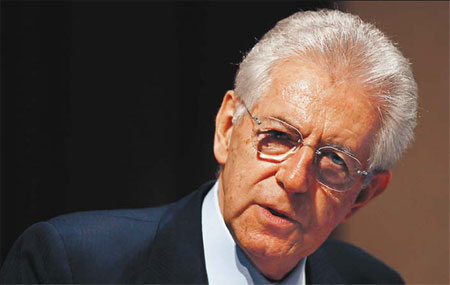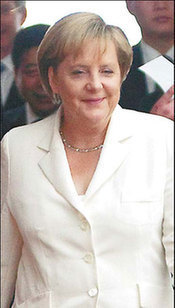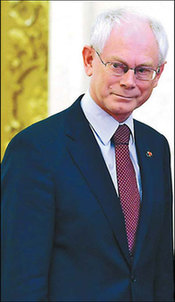School where lessons focus on leadership
Updated: 2012-10-19 10:42
By Tang Yue (China Daily)
|
|||||||||||
|
Mario Monti, Italian prime minister |
|
Angela Merkel, chancellor of Germany |
Growing reputation of the Party's training academy attracts increasing number of high-profile foreign visitors
While it's always been famous in China as a must-go place for all senior officials preparing for leadership positions, the Party School of the Central Committee of the Communist Party of China - usually simply known as the Central Party School - is now an increasingly popular destination for foreign leaders during their tours of the country.
The past decade has witnessed a growing number of foreign leaders or heads of international organizations visiting and addressing the students.
UN Secretary-General, Ban Ki-moon, has visited the school, so has Herman Van Rompuy, the president of the European Council. Other guests include Angela Merkel, the German Chancellor, and Donald Rumsfeld, the former United States' secretary of defense.
This year alone, the Communist Party's cadres-training academy has played host to three serving prime ministers. Italy's Mario Monti visited in March, and was followed by Thailand's Yingluck Shinawatra a month later.
Both were paying their first visits to China since taking office and insisted on including the school in their itineraries.
|
Herman Van Rompuy, European Council president |
Last month, the Singaporean Prime Minister Lee Hsien Loong paid his second visit to the school - seven years after he became the first foreign official to deliver a speech in Chinese there.
"So many foreign leaders want to visit our school now. I'm afraid we have to give priority to high-ranking officials and top scholars because of the busy schedule," says Gong Li, director of the school's Institute of International Strategic Studies.
Gong reveals that Rumsfeld turned down a suggestion from the Chinese government that he should deliver a speech at Peking University when he visited China in 2005. Instead, the US politician insisted on calling at the Party school.
He has good reason. Unlike regular educational institutions, the Central Party School gathers together the country's rising leaders. Since its foundation in Jiangxi province in 1933, the institution, which moved to the capital in 1949, has trained more than 60,000 officials through a range of programs.
Elite students
The school's students are the elite, of course. Lower-level officials are trained at provincial Party schools and a variety of other establishments.
The current principal, Vice-President Xi Jinping, is following in some illustrious footsteps, including former leaders Mao Zedong and Hu Yaobang, and President Hu Jintao.
The high political positions held by the trainees and the school's ties with China's leadership provide a strong motivation for foreign officials to pay a visit, sending their messages to, and building connections with, the country's future leaders.
"It comes as no surprise, when you consider China's rapid pace of development and its growing influence within the international community. A visit to the school indicates that overseas officials have a willingness to learn about the country and the Party," says Song Yinghui, a researcher at the China Institute of Contemporary International Relations.
"Foreign leaders are becoming increasingly aware that visiting the Central Party School is a very effective way of conveying their message and, hopefully, making an impact on Chinese officials," adds Gong.
"It might take another 10 or 20 years before the students really make a difference, but all the officials studying at the school are already experienced decision-makers and are expected to occupy very senior positions in the coming years."
Visits from overseas politicians can also be seen as an acceptance of the Chinese political system and an acknowledgement of its achievements, according to Qu Xing, president of the China Institute of International Studies.
"They realize that the Communist Party will be in power over the long run and so they understand the necessity of increasing their dialogue with it," he says.
Free discussion
Unlike their addresses to students, overseas officials know that speeches at the school have to be realistic and firmly related to the current international situation or bilateral affairs.
"When addressing college students, visitors usually talk about their personal values or the 'American dream', things like that, but at the Party school, they are more likely to discuss specific issues," says Jin Canrong, deputy dean of the School of International Studies at Renmin University of China.
In his recent speech to the school, Lee Hsien Loong said the Association of Southeast Asian Nations should adopt a "neutral and forward-looking" position on disputes in the South China Sea, otherwise the organization's influence could be damaged.
And when he spoke about the US, Lee reminded the hundreds of officials present that, "it is currently facing some very difficult problems, but it is not a nation in decline ... The US is an enormously resilient and creative society, which attracts and absorbs talent from all over the world, including many people from China and the rest of Asia.
"We should never underestimate the US' capacity to reinvigorate and reinvent itself," he said.
Van Rompuy visited the school in May last year, in an attempt to allay fears about the impact of the eurozone debt crisis.
"The euro is the world's second reserve currency and a strong and stable currency - even too strong, compared, for instance, with your currency. We are determined to defend and develop these assets," he told the assembled staff and students, according to Reuters.
Back in 2005, Rumsfeld "urged the next generation of China to become a major player in the global economy by taking steps to strengthen the system", the New York Times reported.
Academic institution
The school is an academic institution and, as such, all the speeches and discussions are regarded as part of an academic exchange. That fact frees the speaker, and the Chinese officials taking part in the discussion, from concerns about unwanted political consequences, Gong notes.
"The speeches aren't formal diplomatic occasions and are different to bilateral negotiations, so both sides feel able to express their opinions in a more relaxed way," says Qu, who served at the Chinese embassy in France from 2006 to 2009.
Having listened to speeches by Henry Kissinger, Rumsfeld, Shinawatra and Merkel, and having been present at the subsequent discussions, Gong says foreign officials are often impressed by the detailed questions asked by Chinese officials.
"They were not just getting their message across, they were keen to learn what Party officials thought, through face-to-face interaction," he says.
"The last thing we want to see is misunderstandings between the major powers, and that risk is reduced by this sort of interaction."
The school provides tuition on topics such as political science, public management and economics. Provincial and ministerial-level officials usually receive two months training, while younger and middle-aged officials, those in their 30s and 40s, spend six months to a year at the academy.
Speeches delivered by foreign officials and subsequent interaction with them provide a much-needed complement to the school's curriculum. They help to improve the global perspective of Chinese officials, which is becoming increasingly important given the country's influence in international affairs and its ever-deepening integration with the global market, Gong says.
"Officials at all levels are finding themselves dealing with foreign dignitaries and enterprises more frequently now. Listening to foreign politicians and officials, and even having discussions with national leaders, interests the students and provides plenty of benefits," he adds.
tangyue@chinadaily.com.cn
(China Daily 10/19/2012 page24)
Today's Top News
Rescuers race against time for quake victims
Telecom workers restore links
Coal mine blast kills 18 in Jilin
Intl scholarship puts China on the map
More bird flu patients discharged
Gold loses sheen, but still a safe bet
US 'turns blind eye to human rights'
Telecom workers restore links
Hot Topics
Lunar probe , China growth forecasts, Emission rules get tougher, China seen through 'colored lens', International board,
Editor's Picks

|

|

|

|

|

|








